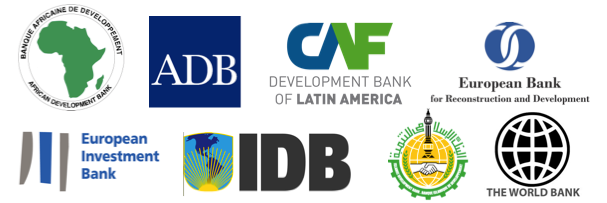
Online Resources of Voluntary Commitment
- Original text of the MDB’s Voluntary Commitment to Sustainable Transport
- 1st Status Report-Commitment to Sustainable Transport (2013)
- First Progress Report of (2012-2013) of the MDB Working Group on Sustainable Transport
- Second Progress Report (2013-2014) of the MDB Working Group on Sustainable Transport
Summary
Over the coming decade, MDBs will continue to play a leading role in providing financial support for transport in developing countries. These investments will help to develop more sustainable transport– transport that is accessible, affordable, efficient, financially sustainable, environment friendly, and safe.
The financial support provided by our organizations will help develop and implement sound policies for sustainable transport, build capacity of institutions, finance projects and disseminate best practices
Plan of Action
We will work with other development partners and civil society organizations to leverage each others’ strengths, and through multi-stakeholder partnerships including the Partnership on Sustainable Low Carbon Transport (SLoCaT). We expect that particular aspects of the sustainable transport agenda – such as improving access and mobility for the poor, reducing transport-related GHG emissions, and improving road safety – will justify the establishing of special financing facilities by donor countries and, potentially, sovereign wealth funds and the private sector. To monitor our progress towards meeting our commitment, we will introduce annual reporting on our sustainable transport related lending and to developing common arrangements for this purpose.
Deliverables
By 2022, in more than 150 countries served by the MDBs collectively:
- Policies supportive of sustainable transport are developed and implemented;
- Institutional capacity to support sustainable transport is built;
- Knowledge and expertise on sustainable transpor is generated, disseminated and widely used;
- Financial resources of $175 billion mobilized for transport.
Update of Progress (2013-2014)
Since Rio+20, our multilateral development banks (MDBs) have taken several major steps to operationalize the Rio+20 Commitment. The first year of our Commitment focused primarily on
- Concretizing the working arrangements,
- Developing a common framework for monitoring and reporting, and
- Initiating work to monitor the sustainability of our transport operations.
At the end of 2013, we completed our First Progress Report, which shows that we are generally on track to meeting our Rio+20 Commitment. In terms of volume, we approved collectively more than $20 billion in financing in 2012. Beyond financing, our MDBs are working to leverage change through capacity building, knowledge sharing and policy dialogue.
While preliminary in nature, we have completed the development of a common monitoring and reporting framework for transport projects, and this has been pilot tested by several of our MDBs. These tests show that the framework is readily applicable to the projects supported by most of our MDBs, and provides a useful tool to understand the relative strengths and weaknesses of different projects with regards to their sustainability.
Challenges
- Cooperate with recipient countries, development partners, donor countries and civil society
- To the extent justified, create and administer special financing facilities by donor countries, sovereign wealth funds and the private sector to support particular aspects of sustainable transport
- Annually report on our sustainable transport related lending and develop common arrangements for this purpose
Post-2015 Development Agenda
The MDBs will continue to work under the WGST to develop and launch its first Annual Report by end of 2013. The Annual Report will provide information on the types of projects supported by the MDBs, as well as ways in which MDBs have catalyzed changes in developing countries through policy support, capacity building and knowledge transfer.
Focal Persons
Tyrrell Duncan, Chair of the MDB Working Group on Sustainable Transport (tduncan@adb.org)
Ko Sakamoto (ksakamoto@adb.org)